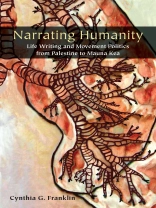In Narrating Humanity, Cynthia G. Franklin makes a critical intervention into practices of life writing and contemporary crises in the United States about who counts as human. To enable this intervention, she proposes a powerful new analytical language centered on “narrative humanity, ” “narrated humanity, ” and “grounded narrative humanity” and foregrounds concepts of the human that emerge from movement politics. While stories of “narrative humanity” propagate the status quo, Franklin argues, those of “narrated humanity” and “grounded narrative humanity” are ones that articulate ways of being human necessary for not only surviving but also thriving during a time of accelerating crises brought on by the intersecting effects of racial capitalism, imperialism, heteropatriarchy, and climate change.
Through chapters focused on Hurricane Katrina; Black Lives Matter; the Palestinian-led Boycott, Divestment and Sanctions movement; and the Native Hawaiian movement to protect Mauna a Wākea, Franklin reveals how life writing can be mobilized to do more than perpetuate dominant forms of dehumanization that underwrite violence. She contends that life narratives can help materialize ways of being human inspired by these contemporary political movements that are based on queer kinship, inter/national solidarity, abolitionist care, and decolonial connectivity among humans, more-than-humans, land, and waters. Engaging writers, artists, and activists who inspire radical forms of relationality, she comes to write side-by-side with them in her own acts of narrated humanity by refusing the boundaries between autobiography, community-based activism, and literary and cultural criticism.
قائمة المحتويات
Preface and Acknowledgments | ix
Introduction : The Human in Crisis | 1
PART I: NARRATIVE HUMANITY
1 Love and Terror: Formulas of Citizenship in Zeitoun and Trouble the Water | 33
2 Criminals and Kinship: Fruitvale Station, Between the World and Me,
and Black Selfhood in the Age of BLM | 68
PART II: NARRATED HUMANITY
3 From Movement to Memoir: When They Call You a Terrorist
and the Power of Queer Black Kinship | 109
4 “Nursing Visions of the Unimagined”: BDS and Steven Salaita’s
World-Making Narratives of Fatherhood, Affiliation, and Freedom | 144
PART III: NARRATED HUMANITY AND GROUNDED NARRATIVE HUMANITY
5 “E Hū ē” (Rising Like a Mighty Wave): Mauna Kea and the Movement beyond the Human | 187
Postscript : Hope, Joy, and “The Struggle for Ea” | 231
Notes | 237
Works Cited | 255
Index | 283
عن المؤلف
Cynthia G. Franklin is Professor of English at the University of Hawai‘i. She coedits the journal Biography and is author of Academic Lives: Memoir, Cultural Theory, and the University Today (2009), as well as Writing Women’s Communities: The Politics and Poetics of Multi Genre Anthologies (1994).












